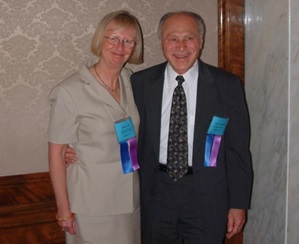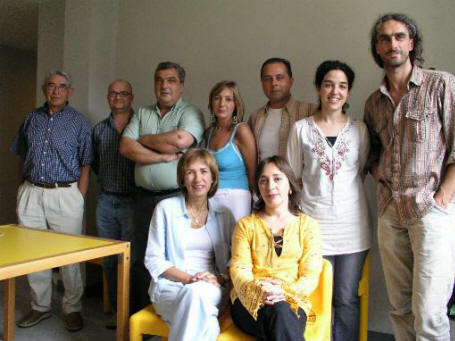Fallece Leonard Stein
- Detalles
- Publicado: Lunes, 09 Julio 2018 01:37

Leonard Stein y Mary Anne Test.
El 9 de julio ha fallecido el psiquiatra Leonard Stein.
Obituary—Leonard I. Stein, M.D.
Len Stein died the morning of Tues July 9, 2018. Included in this obituary is a long and deeply impressive formal list of professional accomplishments. Not included in this formal list is how Len changed the world for hundreds of thousands of people with serious mental illness and for generations of psychiatrists and other clinicians who work with people with serious mental illness.
Len changed how we thought about problems faced by people with serious mental illness. Len had the idea that people with schizophrenia and other serious illness could be treated in the community and have a better quality of life if we only listened to what they needed and what they said they wanted, rather than continue to do what we professionals had always been used to doing. He started with an idea that people should be treated respectfully and that any clinical program needed to ensure that basic needs were met rather than just focusing on medication. He understood the importance of social supports and the need to have a meaning to life. He developed these ideas into a program called PACT where clinical staff went to the patient, physically and emotionally, instead of waiting for them to come to us. He researched this entire idea to demonstrate that it really worked at a time when no one believed that it would, and then nurtured it while it spread around the world, changing and evolving as it developed. His ideas are now implemented in programs in every state in the county, in most of Europe and Australia, in Japan and in South America.
Along the way, Len nurtured generations of clinicians to see the world in a very different way. He changed the nature of the dialogue with patients from diagnosis and medication to the patient’s view of what was important and the patient’s view of the problem. And as he would listen to patients, they would more often than not listen back.
And Len was the ultimate mentor. For those fortunate enough to work with him, he taught us, listened to us, took care of us, shielded us when needed and then backed out of the way when it was time for us to be in the spotlight. Mentoring, taking care of others, his students, his staff, was all part of who he was and what he did. There are generations of clinicians he taught, who then went on to teach others. Now 3 and 4 and 5 generations later clinicians are being influenced by this man whom they have never met.
Leonard I. Stein, M.D., was Professor Emeritus of Psychiatry at the University of Wisconsin Medical School in Madison. In addition, he was National Program Director of the Robert Wood Johnson Foundation’s Mental Health Services Development Program. He is a Life Fellow of the American Psychiatric Association, a Fellow Emeritus of the American College of Psychiatrists, an Honorary Member of the American Association of Community Psychiatrists and an Honorary Fellow of the Royal College of Psychiatrists (UK).
Dr. Stein was born in Connecticut and grew up in rural New Jersey, Chicago, and Madison, Wisconsin. He earned his B.S., M.S. (Botany), and M.D. degrees at the University of Wisconsin in Madison. He did his medical internship at Los Angeles County General Hospital and his residency in psychiatry at the University of Wisconsin Hospital and Clinics in Madison.
After residency, he was an inpatient unit chief at the Mendota Mental Health Institute before going to the University of Kentucky in 1966 to join the faculty. He returned to the Institute after two years, where he later became Director of Research and began his studies on community treatment of persons with serious long term mental illness.
In 1975, he joined the faculty of the Department of Psychiatry at the University of Wisconsin Medical School, where he developed an outstanding training program in community psychiatry. He also became Medical Director of the Mental Health Center of Dane County, where he developed a model system of community-based care for persons with severe and persistent mental illness that has become nationally and internationally recognized.
Throughout most of his professional life, he has combined university-based research and training with program development and administration in public mental health institutions. His work has revolutionized the care for persons with severe and persistent mental illness. He has been one of the leading figures nationally and internationally in the conceptualization and implementation of comprehensive mental health services. He has had a distinguished and multi-faceted career in research, training, clinical services, and advocacy.
Listed below are some of the awards Dr. Stein has received:
1974—Gold Achievement Award presented to Mendota Mental Health Institute by the American Psychiatric Association for the Training in Community Living Program developed by Drs. Stein and Test
1989—Inaugural John Beard Memorial Award for outstanding contributions to the field of psychosocial rehabilitation presented by the International Association of Psychosocial Rehabilitation Services
1989—Exemplary Training Award presented by the National Alliance for the Mentally Ill to the Dept. of Psychiatry, University of Wisconsin Medical School, largely because of the training in working with persons with severe and persistent mental illness conceived and developed by Dr. Stein
1990—Arnold L. van Ameringen Award in Psychiatric Rehabilitation presented by the American Psychiatric Association
1993—Arthur P. Noyes Award for outstanding contributions to the treatment and/or understanding of Schizophrenia
1993—Honorary Fellowship in the Royal College of Psychiatrists, United Kingdom, for outstanding contribution to the development of community psychiatry
1993 - Keystone Founder Award, for outstanding contributions to the field of case management, presented in Philadelphia at the 2nd National Mental Health Services Case Management Conference
1993 - The Carl A. Taube Award from the Mental Health Section of the American Public Health Association for outstanding contributions to the field of mental health services research
1995 - The Distinguished Service Award presented by the National Alliance for the Mentally Ill
1995 - The Lawrence Kolb Award, for outstanding contributions to the treatment of persons with severe mental illness, presented by the Middletown Psychiatric Center, Middletown, NY
1997 - Special Presidential Commendation from the American Psychiatric Association for contributions in developing a model system of community care and in providing leadership in community psychiatry both in the United States and abroad.
1998- Wisconsin Medical Alumni Association Citation Award. An award given to an alumnus of the University of Wisconsin Medical School.
1998- The Cummings Psyche Award. For significant and enduring contributions on behalf of people suffering from severe psychiatric disabilities that have enabled them to live in their own homes in relative comfort and dignity, and for reshaping the entire treatment of the seriously mentally ill.
2002 – ACT Founder Award. Given by the Assertive Community Treatment Association for being the founder, along with Mary Ann Test, of the Assertive Community Treatment model leading to improved mental health systems fostering growth and independence for persons suffering from severe and persistent mental illness. Given at the eighteenth annual meeting of the Association in Chicago, Illinois, June 20, 2002.








